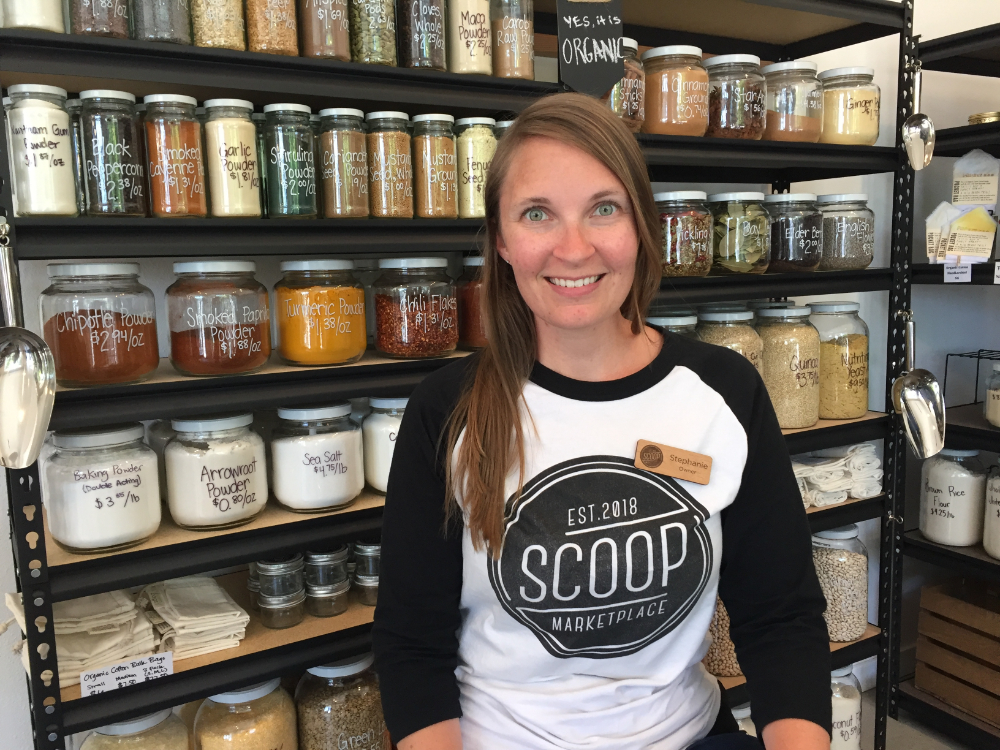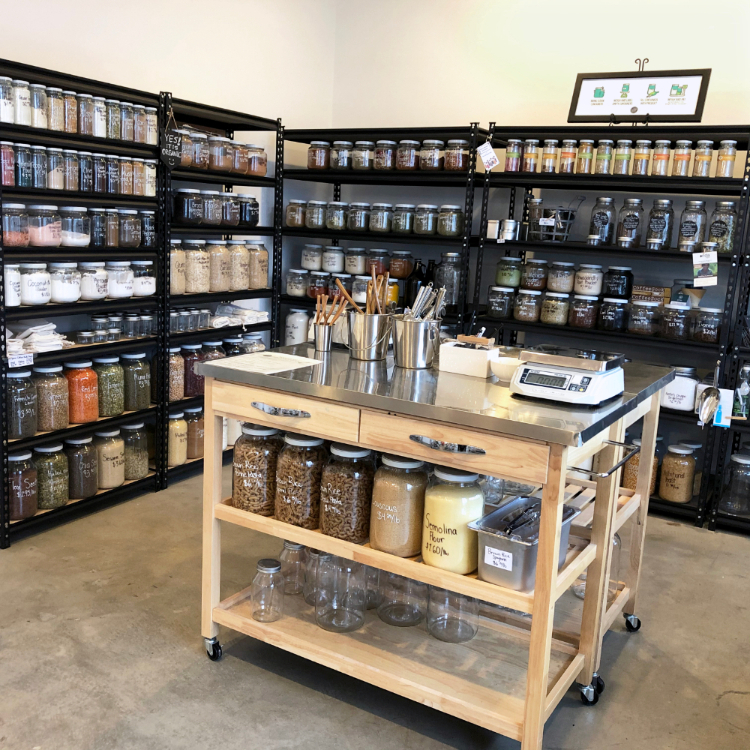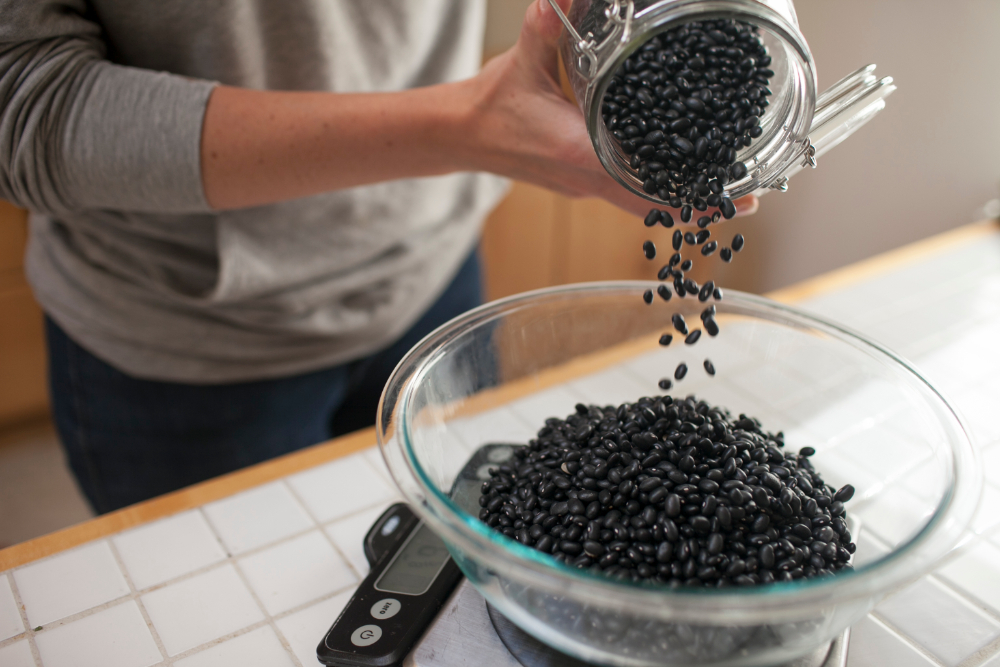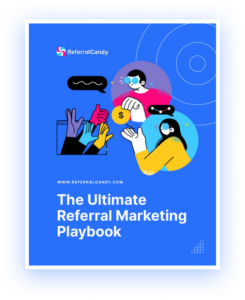Stephanie Lentz opened Scoop Marketplace in Seattle to ‘normalize zero-waste grocery shopping and teach people how to walk gently on the planet’, and to create a more financially independent future for herself and her young family.

Stephanie Lentz in her sustainable bulk grocery in Seattle
Stephanie always knew what she wanted in life: to be a third-grade teacher – and a mother.
After graduating and getting married, she achieved the first part of this goal: she started working as a teacher. But when Stephanie was ready to have kids, she was worried that her body would be too stressed to get pregnant in this line of work. So she gave up her teaching job and dedicated herself to looking after her young and growing family.
After having a baby, Stephanie realised just how many disposable items were needed. From diapers to nursing pads, there was so much waste just three weeks after giving birth. She felt like her family had filled their own landfill.
To try and find a solution to the ‘ridiculous’ amount of disposables they needed, Stephanie dived deep into learning. She learned about microplastics, the reasons for going plastic-free, minimalist lifestyles, and plant-based living. As a result, Stephanie set out to live sustainably. As a family, they tried to reduce their environmental impact as much as possible, avoiding waste and becoming vegetarian.
She felt like she and her family were doing a pretty good job. But she noticed just how hard it was to come home from a grocery shop without trash. It was easier for them, as their plant-based lifestyle meant that they could shop mainly bulk foods and the produce section. But not everyone had access to a bulk foods section, so usually they encountered a lot of unavoidable plastic.
It was Stephanie’s sense of entrepreneurship that helped her see that her new-found sustainable lifestyle could be turned into a business.
Having lived in Seattle her whole life, she was also noticing changes in her city. Over the past 10 years, she had noticed a massive increase in the amount of litter. She couldn’t understand where it was all coming from. She began to worry that the incredible outdoors she had enjoyed may not be around for her children to experience in the same way.
Stephanie saw a way she could make a difference: she could start her own zero-waste store.
“I had seen these zero-waste stores popping up in Europe specifically. It just felt like a good fit for Seattle. I felt like a zero-waste store it would meet our needs and solve some of our problems. So, I figured there were probably other people in the area who needed the same thing.”

Stephanie’s wish was that her store would allow customers to shop with reusable containers. They could fill these with as much or as little as they wanted or needed of package-free food, home goods and personal care products. It was a response to the devastating impact our disposable culture of convenience has had on our environment and tapped into the increasing interest in living a more sustainable lifestyle.
Although she saw a clear gap in the market, she was apprehensive at first. But eventually, she decided to open her own business.
Initially, she convinced herself it was all too overwhelming and that she was under-qualified to start a business. “What surprised me though, is that I had the idea and after a while, I started taking action.. and then I just kept taking action on it.”
She began taking classes on entrepreneurship and started to change her mindset around money. Stephanie and her husband began to believe that they could have something different. Her husband was also reconsidering his career: maybe he didn’t need to be a firefighter his whole life. “We started to think that maybe we could build something that leaves us more time and space to be together as a family.”
Stephanie’s big turning point when her dream became reality was when she completed her business plan.
“I was certain that I could not write one. I was certain there was no way I’d be able to figure that out. I couldn’t do the market research and prove that there was some viability here.” But she did and surprised herself that all of a sudden she had something to present to lenders or landlords.
“I went from telling myself constantly that I was overwhelmed and underqualified to say: well, I managed a business plan! So what’s next?”
What she needed was finance and community support. So she set about crowdfunding. There was enough interest from the community to help her to open a 200 square foot store in Seattle’s Central District on Earth Day, 2019.

“I met my friend Kim when she backed my first campaign. We connected in the zero waste community at one of the meetups. She came to my soft launch and helped me clean and set up and get ready. She brought me food, made a purchase and told all of her friends about it. It’s those little things that make it so much easier for me to measure the impact that I’m having. Because it’s personal and it’s individual. Those little moments keep me going.”
It seemed like all was on track for success. Funding, support from the zero waste community, repeat customers…
To be successful in ‘a man’s world’ though, she was feeling the pressure to hustle and grind. You have to be all about the business. “The expectation is that if you want to be successful, you can’t prioritize parenting, or your business will fail.” So Stephanie hustled and worked hard.
Stephanie began to worry that being a small business owner was taking her further away from her life goal: to be more available for her family.
When she was at work, she was concerned that her kids or her husband might need her, or her kids might be missing her. When she was with her kids, she would feel like she wasn’t doing enough. She felt she was falling behind from a business perspective.
“There’s a lot of cultural pressure to be amazing at both things. To give 100% to being a mother and also 100% to being a business owner. So no matter which role you are playing, you are constantly worried you aren’t doing enough.”
This daily struggle of responsibilities had Stephanie wondering if she had done the right thing. She would get so caught up in the tasks, to-do lists, emails and messages, that her head was spinning. She felt so anxious about the business that she would struggle to realise that when she shut it down at the end of the day, she would still be a mother.
Stephanie realised that the only way to achieve a good work/life balance would be to re-design the business so that she could entrust the day-to-day to a manager.
This gave her room to push back against the expectations and say “I will be a present mother, but I will also be a successful business owner.” She set herself boundaries. As her manager took over the urgent responsibilities, she could leave her phone in her bag, or her laptop in another room – and not feel guilty.
She worked towards building a team to support her while she focused on the creative, visionary, and educational aspects of the business. These elements of her job are less urgent, and allow her to strike a better balance between work and family. ‘I think it’s getting a little better. I’m putting things in place where I feel a little more comfortable.”
Now, Stephanie is re-inventing Scoop again. Drawing on her skills as a teacher, she wants to help change the world by sharing her knowledge with others.
Her sustainability mission is ever-growing. Bringing her skills as a teacher back into play, she has launched an education portal called Scoop Intelligence. She offers courses and workshops to help others open their own zero-waste businesses.
“I think that is where I’m having the biggest impact. When I was starting my business, I had no idea what to do. There are all kinds of resources online, but there was nothing that told me ‘Steph, this is how you open a zero-waste store. Just take these steps and you will be successful.’ I reached out for help, and obviously, small business owners are very busy and don’t have time for things like that.”
Many people were also afraid that Scoop was going to be a competitor. “This was surprising to me because I thought that we were all working towards the same mission: building a sustainable future for all people. I thought they’d be glad to have me join the fight – but that wasn’t the case. So now I’ve created something where people can come and get all of their questions answered.”

Stephanie gives her students her templates, her numbers from her first year in business, her SOP’s. She shares her bestsellers and her list of vendors. She doesn’t hold back, because she feels like they are all on the same team.
Starting her small business let Stephanie take care of her family while sharing her knowledge with the world.
Just a year and a half after opening, they are moving into a place over 5 times the size – lots of room for new products and growth. Stephanie also feels like she’s part of the beginning of a much bigger zero waste movement. She’s starting to see zero waste stores pop up all over North America.
In this period of large growth, she tries to remind herself “that I am the one in control of how I spend my time and my energy. If I allow myself to spin around in an anxious tizzy, I have to be the one to relieve the pressure and give myself space to thrive, no matter what stage.”


